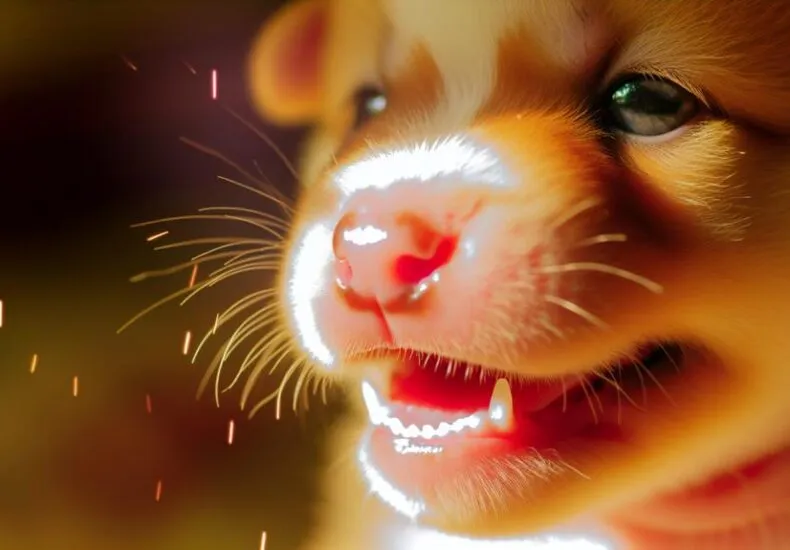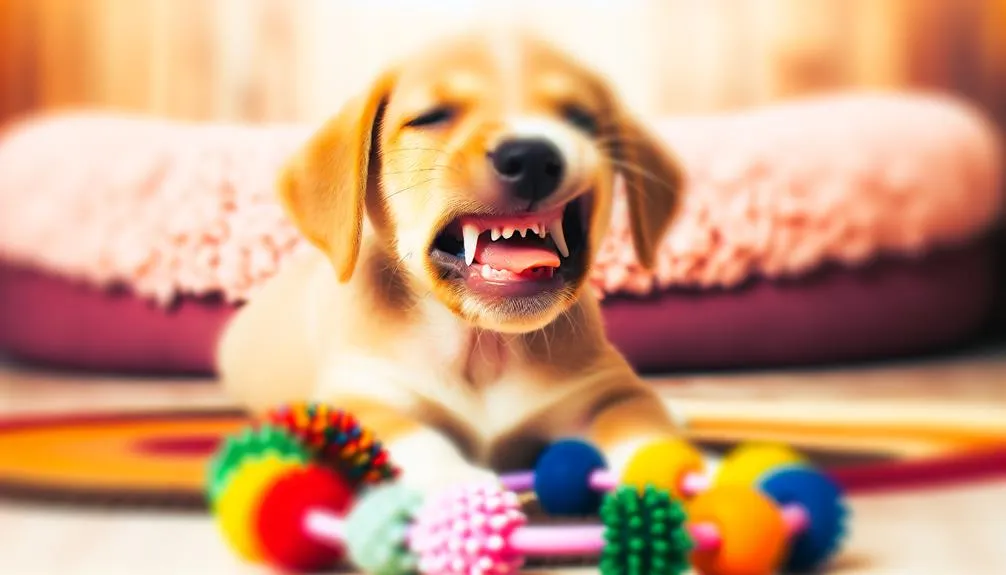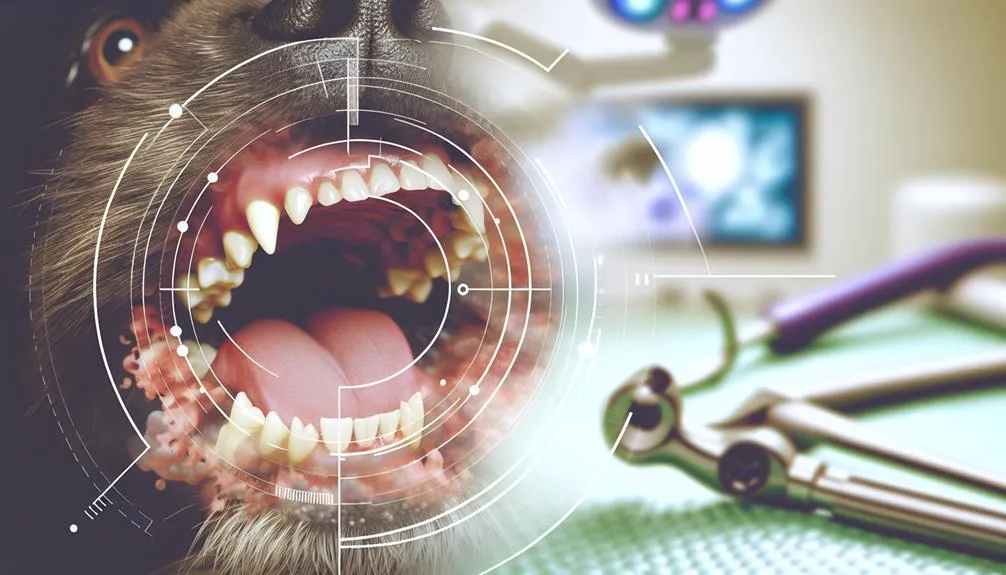
Do Dogs Have Baby Teeth
You might be surprised to learn that dogs do, in fact, have baby teeth, often referred to as deciduous teeth. These tiny teeth play a vital role in a puppy's early life, aiding in nursing and the shift to solid food. By six weeks, a puppy can have up to 28 of these teeth, but they don't stick around for long. As adult teeth emerge around six months, some interesting challenges can arise. What happens during this teething phase, and why is it important to monitor your pup's dental health?
Understanding Canine Dental Development
From the moment a puppy is born, its dental development begins, paving the way for a healthy mouth throughout its life. Understanding canine dental development is essential for you as a pet owner. Puppies, like humans, have a set of baby teeth, also known as deciduous teeth, which play a significant role in their growth and overall health. In total, they'll have 28 baby teeth that will emerge within the first few weeks of life. These teeth are designed to help them nurse effectively and begin the process of weaning onto solid food.
During this early stage, focusing on dental hygiene is fundamental. Although puppies don't require brushing as soon as their teeth arrive, you should still be attentive to their oral health. Regularly inspecting their mouths can help you catch any potential issues early on. It's important to remember that the structure of a puppy's mouth is part of its overall canine anatomy. As they grow, their baby teeth will eventually fall out, making way for 42 permanent teeth.
Moreover, establishing good dental hygiene habits early on can set the tone for your dog's future health. Incorporating safe chew toys and dental treats can help guarantee that your puppy's teeth remain healthy and clean. By understanding your puppy's dental development, you're not just caring for their teeth; you're promoting a healthier, happier life for your furry friend.
Timeline of Puppy Teeth
Puppies experience a specific timeline for their dental development that's important to understand as a pet owner. The journey of your puppy's teeth begins at around three weeks of age, when their baby teeth, also known as deciduous teeth, start to erupt. During this period, you'll notice the first incisors emerging, generally followed by canines and premolars. By six weeks, most puppies will have a full set of 28 baby teeth.
As your puppy grows, they'll enter the puppy teething phase, which typically occurs between three and six months of age. This can be a challenging time, as the process of tooth eruption can cause discomfort and sometimes irritability. You may see your puppy chewing on various objects to alleviate this discomfort, which is a natural behavior during this stage.
Around six months, the baby teeth begin to fall out, making way for the adult teeth. The adult teeth number 42, and this change is essential for proper dental alignment and health. It's important to monitor your puppy during this time, as some puppies may experience issues with retained baby teeth, which can lead to dental problems later on.
Importance of Baby Teeth

Understanding the importance of baby teeth is critical for ensuring your puppy's overall health and development. Just like human infants, puppies have baby teeth that play a significant role in their growth. These teeth not only help your puppy chew food but also aid in the development of their jaw structure and alignment. Properly functioning baby teeth set the stage for adult teeth, ensuring they come in correctly and maintain ideal dental health.
During the early stages of life, puppies are naturally inclined to chew on various objects, which helps in the eruption and proper positioning of their baby teeth. If these teeth become damaged or decay, it can lead to misalignment or dental issues in adulthood. This emphasizes the importance of monitoring your puppy's dental health from a young age.
Moreover, baby teeth can sometimes be retained even after adult teeth start to emerge, leading to overcrowding and complications. If you notice any abnormalities, it is crucial to consult a veterinarian for guidance.
Taking care of your puppy's baby teeth sets a solid foundation for their long-term dental health. Regular dental check-ups, along with appropriate chew toys, can help maintain their baby teeth until they naturally fall out. By understanding their significance, you're not just promoting healthy teeth but also fostering your puppy's overall well-being.
Care During Teething
As your puppy's baby teeth begin to erupt, you'll likely notice some changes in their behavior. They might seem more irritable, chew more frequently, or even drool a bit more than usual. This is completely normal and part of the teething process. To help ease your puppy's discomfort, it's crucial to provide proper care during this time.
One of the most effective ways to alleviate your puppy's teething pain is through the use of teething toys. Look for toys that are specifically designed for teething puppies; they should be soft yet durable. Rubber and silicone options are great choices as they can withstand chewing while providing a soothing sensation on sore gums. You can even chill these toys in the refrigerator for extra relief.
In addition to teething toys, consider employing soothing techniques to help your puppy through this uncomfortable stage. Gentle gum massages can be beneficial—using a clean finger, lightly rub your puppy's gums for a minute or two. This not only offers comfort but also helps your puppy become accustomed to having their mouth handled, which is vital for future dental care.
Always monitor your puppy during this phase. If they seem excessively distressed or if you notice any unusual symptoms, consult your veterinarian. Taking proactive steps can make teething a more manageable experience for both you and your furry friend, helping them shift smoothly into adulthood.
Common Dental Issues

Dental health is essential for your dog's overall well-being, and several common dental issues can arise as they grow. As a responsible pet owner, it's important to be aware of these issues, particularly tooth decay and gum disease, which can greatly impact your dog's health if left untreated.
Tooth decay occurs when plaque—a sticky film of bacteria—builds up on your dog's teeth. If not removed through regular brushing or dental cleanings, it can harden into tartar, leading to cavities and potential tooth loss. You might notice bad breath, discomfort while eating, or visible plaque on their teeth. Regular dental check-ups can help catch these problems early.
Gum disease, or periodontal disease, is another prevalent issue, especially in older dogs. It starts with gingivitis, where the gums become swollen and may bleed. If not addressed, it can progress to more severe stages, causing pain, tooth loss, and systemic health issues affecting the heart and kidneys. Signs of gum disease include red or receding gums, persistent bad breath, and difficulty chewing.
Frequently Asked Questions
Do All Dog Breeds Have the Same Number of Baby Teeth?
Not all dog breeds have the same number of baby teeth due to breed tooth variation. During puppy dental development, most breeds typically have 28 baby teeth, but some may deviate slightly based on genetics.
Can Baby Teeth Cause Behavioral Changes in Puppies?
You might notice your puppy acting differently as those baby teeth come in. Puppy discomfort can lead to altered chewing habits, causing them to chew more aggressively or seek out relief, impacting their behavior considerably.
What Is the Size Difference Between Baby and Adult Dog Teeth?
The size difference between baby and adult dog teeth is significant. During puppy dental development, baby teeth are smaller, while adult tooth eruption brings larger, stronger teeth, essential for chewing and overall health as dogs mature.
Are There Specific Toys Recommended for Teething Puppies?
When your puppy's discomfort dances like a fleeting shadow, teething toys become a beacon of comfort. Opt for rubber or fabric options that soothe aching gums, ensuring your furry friend finds relief during this challenging time.
How Can I Tell if My Puppy Is Teething?
To tell if your puppy is teething, watch for common teething signs like increased chewing, drooling, and restlessness. You might notice some puppy discomfort, but providing appropriate toys can help alleviate their pain.
Conclusion
In summary, understanding your puppy's dental development is essential for their health. Just like a child's first teeth pave the way for a beautiful smile, your pup's baby teeth set the stage for strong adult teeth. When my friend's golden retriever lost his first baby tooth, it was a bittersweet moment—like watching a toddler take their first steps. By providing proper care during this teething phase, you'll help guarantee a lifetime of healthy, happy smiles for your furry companion.
You may also like
Archives
Calendar
| M | T | W | T | F | S | S |
|---|---|---|---|---|---|---|
| 1 | 2 | 3 | 4 | 5 | 6 | |
| 7 | 8 | 9 | 10 | 11 | 12 | 13 |
| 14 | 15 | 16 | 17 | 18 | 19 | 20 |
| 21 | 22 | 23 | 24 | 25 | 26 | 27 |
| 28 | 29 | 30 | ||||
Leave a Reply